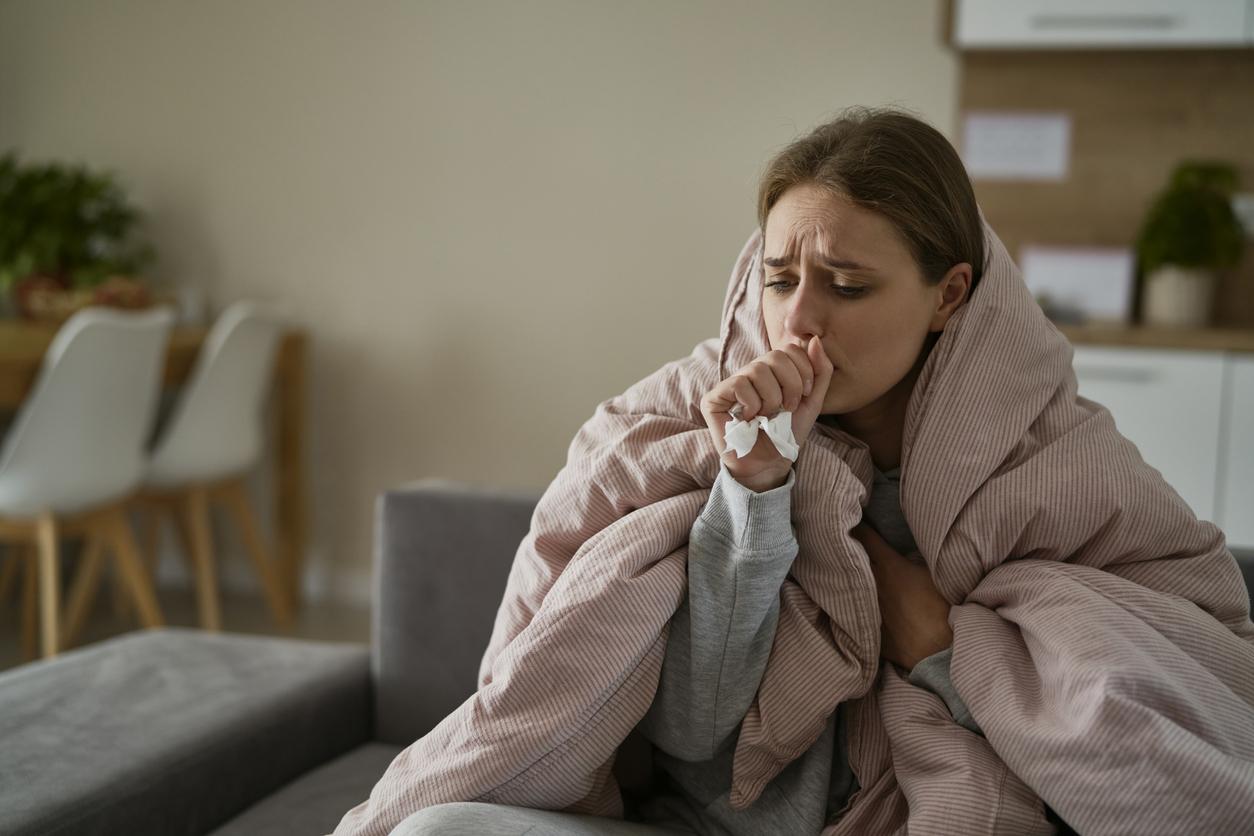The flu epidemic now affects all regions (with the exception of Corsica) and the virus is circulating quickly, according to the latest bulletin from Public Health France (March 16). At the same time, the Covid epidemic is on the rise again (as of March 16, more than 100,000 cases had been diagnosed in 24 hours), in a context of relaxation, and while wearing a mask is no longer mandatory indoors (except in transport and health facilities).
The SARS-CoV-2 coronavirus (which is responsible for Covid-19) and the influenza virus (which causes the flu) have many points in common: they are so-called “RNA” respiratory viruses, which means that they have need the cellular machinery of the cell they infect to reproduce. They are able (during replication) to mutate, that is to say to change.
Moreover, these two respiratory viruses are transmitted in the same way: via droplets of saliva (projected when speaking, coughing, sneezing, etc.) and via physical contact (when the kiss, when we shake hands…).
Symptoms: how do I know if I have the flu or Covid-19?
Unfortunately, “it is often difficult to tell the difference between a Covid-19 and the flu on the simple observation of the symptoms, even when you are a doctor” recognizes Dr. Philippe Laurent, pulmonologist.
In the event of Covid-19 or flu, one can thus observe fever (with a body temperature above 38°C), respiratory signs (a dry or oily cough, shortness of breath, etc.), significant fatigue ( we speak of asthenia) and/or body aches (myalgia).
To know. “Statistically, in the event of Covid-19, we rather see the fever appear before the cough; for the flu, it’s the opposite. But that’s still theory“says the pulmonologist. Moreover, the Covid-19 like the flu can be more or less symptomatic …
There are, however, signs that may suggest Covid-19 rather than the flu: these include digestive signs (diarrhea, for example), sometimes intense headaches (headaches) and loss of taste and/or smell (ageusia/anosmia) or even odynophagia in the case of the Omicron variant.
And also… The flu evolves by seasonal epidemics: between the months of November and April, we can first think of the flu before the Covid-19.
Flu or Covid-19: when should you consult?
In the event of symptoms that are reminiscent of the flu or Covid-19 (fever, cough, severe fatigue, etc.), the best thing is to do a video consultation with your attending physician in order to be prescribed a PCR or antigen test: “do not go to the office, at the risk of transmitting your Covid-19, if you suspect you have caught it!” advises Dr. Philippe Laurent.
“For young adults and children, it is important to know if you have Covid-19 in order to apply the necessary isolation measures and warn contact persons.“
“Differentiating between Covid-19 and influenza is crucial in patients who are at risk of developing a severe form in the event of infection with the SARS-CoV-2 coronavirus: renal or respiratory failure, chronically ill patients, patients treated with chemotherapy, hospitalized patients, nursing home residents…“says the doctor. Also, if you have symptoms that may suggest the flu or Covid-19, do not wait to call your doctor!
Flu or Covid-19: what about vaccines?
“The flu vaccine is effective, but only about 65% effective, provided you get vaccinated again every year: it is therefore not an insurmountable bulwark against the flu“explains Dr. Philippe Laurent.
Same thing for vaccines against Covid-19: “if these vaccines are very effective (generally more than 90%), they only protect against infection up to about 50%. They have been designed to significantly reduce the risk of a severe form of Covid-19“.
Whether you have been vaccinated against the flu and/or against Covid-19, it is therefore always possible to catch these diseases… “Although it is always possible to catch the flu or Covid-19 despite vaccines, those for whom it is recommended should not miss getting vaccinated because they massively protect against an evolution towards forms which can be fatal or leave serious sequelae“says the doctor.
Thanks to Dr. Philippe Laurent, pulmonologist at the Aressy clinic (Pyrénées-Atlantiques – ELSAN group).
Read also :
- Why do children have fewer severe forms of Covid-19?
- Covid-19: 73 experts call for vitamin D supplementation
- Covid-19: these promising treatments expected in late 2021 or early 2022


















